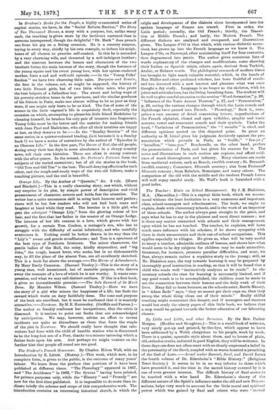In Strahan' s Books for the People, a highly ornamented
series of capital stories, we have, in the " Social Reform Section," The Story of Ten Thousand Homes, a story with a purpose, but, unlike many such, the teaching is given more by the incidents narrated than in sermons interspersed, though the delightful " Dr. Mark " does preach one from his gig on a fitting occasion. He is a country surgeon, trying in every way, chiefly by his own example, to induce his neigh- bours of all classes to practise self-control. In this he is seconded by a very charming wife, and thwarted by a self-indulgent brother ; and the contrast between the homes and characters of the two brothers forms the main interest of the story, though the fortunes of the young squire and his sweet young love, with her opium-enslaved mother, form a sad and well-told episode.—In the " Young Folks' Section " we have two charming little tales. Marquise and Rosette, the first in the volume, not, as might be supposed, the history of two little French girls, but of two little white mice, who prove the best helpers of a fatherless boy. The sweet and loving ways of his poverty-stricken home in the provinces, and the similar goodness of his friends in Paris, make one almost willing to be as poor as they were, if one might only learn to be as kind. The fun of some of the scenes in the little vagrant's life is exquisitely droll, especially the occasion on which, attempting to please his little friend Madeleine by cleaning himself, he brushes his only pair of trousers into fragments. Young folks must be the better and the merrier for making friends with Jean Paul and Madeleine, who after all their troubles are happy at last, as they deserve to be.—In the "Sunday Section" of the same series, in a quieter-coloured binding, (is it because it is a Sunday book ?) we have a series of narratives by the author of "Episodes in an Obscure Life." In the first part, The Haven of Rest, the old people, dozing away their last days in some almshouses in a sleepy country town, tell their own histories. These are often in strong contrast with the after-peace. In the second, Dr. Pertwee's Patients form the subjects of the varied narratives ; but of all the stories in the book, -" Old Tom and Old Tim" is the best. The self-denying affection for each other, and the rough-and-ready ways of the two old fellows, make a touching picture, and the end is beautifuL


































 Previous page
Previous page